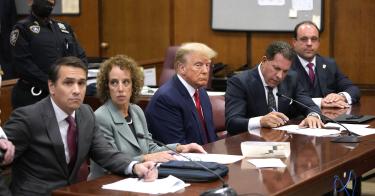Now that the indictment has been unsealed, and Donald Trump has pled not guilty, we can predict how the former president might defend himself in the coming months.
In broad terms, the 34-count indictment alleges that Trump, acting “with intent to defraud,” caused numerous false entries to be made in the business records of the Trump Organization throughout 2017 “with intent to defraud and intent to commit another crime and aid and conceal the commission thereof.” The other crime, according to the prosecutors’ statement of facts, is federal campaign finance violations.
Falsifying business records is a misdemeanor under New York law. If the false entry is designed, however, to cover up another crime, that is a felony. What’s unusual is the alleged crimes Trump was seeking to conceal are federal campaign finance violations.
The Justice Department and Federal Election Commission opened and then closed investigations against Trump without charging him. It’s highly irregular for a local district attorney to resurrect a federal charge and shoehorn it into a state crime.
Here are some of the motions Trump’s lawyers will likely assert.
>>> Unsealed Trump Indictment Previews a Case That Puts Us in Uncharted Territory
Trump may seek to transfer the case out of the city, arguing that since he is a well-known, controversial figure there, he cannot get a fair trial. Upstate New York would obviously be friendlier territory.
Trump could also seek to transfer the case to another judge. Reports indicate Judge Juan Merchan’s daughter runs a company that worked for the Biden-Harris campaign, and Trump has proclaimed on Truth Social that Merchan, who oversaw criminal cases against the Trump Organization and its former CFO Allen Weisselberg, “HATES” him.
Trump could seek to dismiss the charges based on the statute of limitations, normally two years for misdemeanors and five for felonies. Bragg will likely cite executive orders signed by then-Gov. Andrew Cuomo tolling the statute of limitations during the pandemic, as well as a New York law that tolls the limitations period for any period in which “the defendant was continuously outside this state.”
Bragg may contend Trump was in Washington, D.C. from January 2017 to January 2021 and in Florida since then. Trump might counter he frequently visited New York City and, therefore, was not “continuously outside” the state.
It’s also possible that Trump will seek to dismiss the indictment on the grounds of selective prosecution, by arguing he was singled out for prosecution when other similarly situated individuals would never have been charged. While this is a high hurdle to clear, it’s hard to imagine these convoluted charges being brought against anyone not named Donald Trump.
Additionally, Trump (a Republican) will point out when Bragg (a Democrat) was seeking his party’s nomination to his current position, he boasted about how often he had opposed Trump, claiming he had “sued Trump more than a hundred times.”
Trump could argue it is improper for a local district attorney to charge him with violating federal campaign finance laws when the DOJ and the FEC declined to charge him. And he may contend the payments by Cohen and the National Enquirer could not be considered excessive or unlawful campaign contributions because they were never campaign donations in the first place.
>>> The Indictment of Donald Trump: The Players and the Cards They’re Playing
While campaign donations are used to pay for campaigning, paying off jilted lovers (or extortion-minded opportunists, depending on whom you believe) is not a legitimate campaign activity. The reimbursements were paid by Trump and, as former FEC Commissioner Brad Smith recently noted, “an obligation isn’t a campaign expenditure if it exists ‘irrespective’ of the campaign.”
Trump could argue he lacked any “intent to defraud.” He might say he thought he really was paying Cohen for legal services when those payments and the correlative business entries were made. He may say wealthy men are often sued for illegitimate reasons and frequently settle such matters for “nuisance value” or to spare himself and his family any embarrassment (a defense former Sen. John Edwards successfully deployed during his 2011 trial).
Trump might contend he would have made these payments even if he wasn’t running for public office, and non-disclosure agreements are both legal and common whenever high-profile civil matters are settled.
And Trump may face more serious charges on the horizon. The Fulton County District Attorney and the Justice Department are conducting their own investigation against Trump.
As they say at the races, “And they’re off!” Trump and his lawyers will be busy for quite some time.
This peice originally appeared in Bloomberg Law



